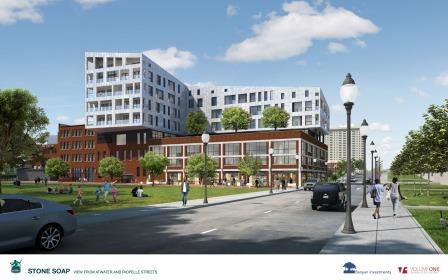It seems perfect given the name.
The Stone Soap building is getting a good cleaning and is being redeveloped into a new mixed-use structure that will renovate existing structures, include new construction and add three to six additional stories on top of the building.
“The riverfront belongs to everybody, and the redevelopment of the Stone Soap building is a big piece of how we are making it a walkable, enjoyable amenity for all Detroiters.” -Mayor Mike Duggan
It’s all part of a $27 million project just announced by the City of Detroit, Detroit Economic Growth Corporation (DEGC) and additional stakeholders. It is the key first step in implementation of the East Riverfront Framework launched in spring 2017.

Detroit-based developer Banyan Investments will take on project. Banyan has restored more than 110 homes in various neighborhoods and developed several historic buildings, including the old bank building at the corner of Kercheval and Van Dyke, the mixed use building at 1400 Van Dyke and the historic Saint Charles School in Detroit’s West Village and Island View neighborhoods.
When the Stone Soap building renovation is finished there will be 63 new residential units, including condominiums and rental units, 20 percent of them reserved as affordable housing for residents making 80 percent of the area median income, or about $38,000 a year. The project also includes new retail space and new, permanent performance space for Shakespeare in Detroit, a locally-based company performing Shakespeare’s works across the city.
The project is expected to break ground in spring 2018 following City Council approval and completion of the project expected by fall 2020.

“The riverfront belongs to everybody, and the redevelopment of the Stone Soap building is a big piece of how we are making it a walkable, enjoyable amenity for all Detroiters” said Mayor Mike Duggan. “It’s also another important piece of our city’s history that is being brought back to life.”
The Stone Soap building has been vacant for at least 20 years. The first two structures in the industrial complex were built in 1907 and a three-story addition followed in the late 1920s. It was home to a number of industrial companies before being purchased by the Stone Soap Company,a manufacturer of commercial detergents for laundries, restaurants and car washes,in the late 1970s. That company occupied the building until the late 1990s.
What’s in the renovated building
- 33 rental apartments in the renovated original structures and30 newly constructed condominiums. The building will include one, two and three bedroom units.
- 20 percent of the total units, 13 apartments, will be dedicated to affordable housing, targeted to people earning 80 percent of the area median income. The number of affordable units meets the minimum 20 percent threshold required by the city’s Affordable Housing Ordinance.
- A gym, pool, rooftop gardens, storage, and bike stations for residents
- More than 13,000 square feet of commercialspace built in a European style, open market concept with retail, food and beverage space for residents and the visitors to the riverfront
- The city’s first parking carousal within an enclosed space, a technology used extensively in New York and other dense urban cities, providing an innovative and space-saving solution to the parking needs of residents and visitors
- Public performing arts space – the new home base for the nonprofit Shakespeare in Detroit (SiD) theater company, which produces live productions of Shakespeare’s works in various locations throughout the city.
Until now, the group has not had a home base for its productions. Now, at no cost to SiD, it will have a permanent space for its operations and performances.

“As someone who was born and raised in Detroit, I couldn’t be more thrilled to finally have a home in one of my favorite places in my hometown, the East Riverfront, for the work that our young arts organization has been doing the past five seasons,” says Sam White, founding artistic and executive director of Shakespeare in Detroit.
East Riverfront Framework plan
The Stone Soap redevelopment is part of the city’s larger East Riverfront framework plan, designed to return the riverfront back to the citizens of Detroit.Under the East Riverfront Framework the East Riverfront area will continue to be transformed from a former blighted, industrial area into a vibrant waterfront for all Detroiters. The boundaries of the East Riverfront district are St. Antoine to the west, East Grand Boulevard to the east, Larned Street to the north and the Detroit River to the south.
The framework will expand the RiverWalk to the east, connecting it to the MacArthur Bridge and Belle Isle, preserve nearly eight acres of land for public parks, improve safety and walkability for Detroiters along East Jefferson. It also includes plans for two new Dequindre Cut-style greenways, connecting the neighborhoods to the north of the riverfront to the amenities like those in renovated historic buildings like the Stone Soap, the first to be redeveloped as part of the plan.
The program was created after several months of extensive residential and stakeholder engagement, which included community meetings, neighborhood walks and district tours that were attended by the general public.
“This new (Stone Soap building) project continues the momentum created by years of investment from DEGC and our partners in public space and infrastructure,” says Moddie Turay, executive vice president of Real Estate at the DEGC. “Demand for more housing and retail amenities in the East Riverfront District has clearly been demonstrated by the successful openings of recent projects.”


